Diplomatic Bluebook 2018
Chapter 3
Japan's Foreign Policy to Promote National and Global Interests
2 Response to Global Issues
(1) 2030 Agenda for Sustainable Development
The “2030 Agenda for Sustainable Development (the 2030 Agenda)” is a set of international development goals to be achieved by 2030, which was adopted by the UN Summit in September 2015 as a successor to the Millennium Development Goals (MDGs).
The 2030 Agenda lists the “Sustainable Development Goals (SDGs)” consisting of 17 goals and 169 targets that are interrelated and closely linked to each other, and which serve as development goals for the whole of the international community including developed countries.
Japan has consistently and proactively contributed to discussions and negotiations for the 2030 Agenda even before full-fledged discussions got underway in the international community. First, Japan established the SDGs Promotion Headquarters headed by the Prime Minister and composed of all Cabinet Ministers as members, formulated the SDGs Implementation Guiding Principles to serve as Japan's guidelines in the implementation of the SDGs, and established eight priority areas that Japan will place particular focus on. Furthermore, Japan puts great importance on public-private partnership for the implementation of the SDGs, and has to date held four Round Table Meetings on the promotion of the SDGs, bringing together stakeholders from a wide range of fields including NGOs, academia, the private sector, and international organizations. It also engages in the exchange of views on initiatives by local governments and businesses towards the promotion of the SDGs. With regard to international cooperation, Japan has, for example, announced at the UN High-Level Political Forum (HLPF) held in July that it will be providing support of 1 billion US dollars by 2018 mainly for the sectors of education, health, disaster risk reduction, and gender, with a focus on the next generation.
At the fourth meeting of the SDGs Promotion Headquarters held in December, the SDGs Action Plan 2018 was unveiled, covering the main initiatives to be undertaken by MOFA as well as other relevant Government Ministries towards the achievement of the SDGs. With the aim of spreading Japan's “SDGs Model,” this Action Plan established, as the basic direction of the model, the promotion of Society 5.0 that is tied in with the SDGs and achieved through efforts by the public and private sectors, regional revitalization driven by the SDGs, and empowerment of the next generation and women as the future leaders who will shoulder the burden of realizing the SDGs. At the same time, the first Japan SDGs Award was held to commend companies and organizations that have put in place excellent initiatives towards the realization of the SDGs. In 2018, the Government of Japan will stand as one to further realize and expand the SDGs initiatives, and at the same time, to further promote the implementation of the SDGs in Japan by sharing successful cases by both the public and private sectors.
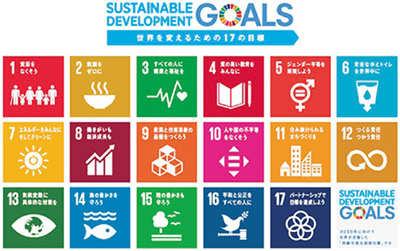 Logos of all 17 goals under the SDGs (Source: UN Information Center)
Logos of all 17 goals under the SDGs (Source: UN Information Center)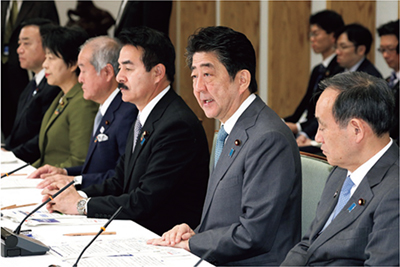 The fourth meeting of the SDGs Promotion Headquarters (December 26, Tokyo; Photo: Cabinet Public Relations Office)
The fourth meeting of the SDGs Promotion Headquarters (December 26, Tokyo; Photo: Cabinet Public Relations Office)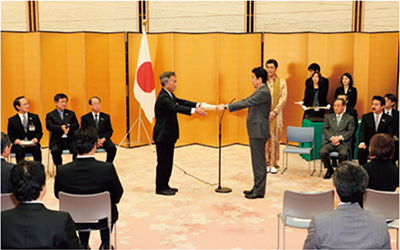 Conferment Ceremony for the Chair of the SDGs Promotion Headquarters (Prime Minister) Award (December 26, Prime Minister's Office, Tokyo, Photo: Cabinet Public Relations Office)
Conferment Ceremony for the Chair of the SDGs Promotion Headquarters (Prime Minister) Award (December 26, Prime Minister's Office, Tokyo, Photo: Cabinet Public Relations Office)The Sustainable Development Goals (SDGs), adopted by consensus at the UN Summit held in 2015, are development goals for the entire international community, including developed countries. Japan is actively promoting initiatives both domestically and internationally while rallying the collective wisdom and knowledge of a wide range of stakeholders, in order to realize a diverse and inclusive society where “no one will be left behind” through the implementation of the SDGs. This Special Feature showcases some of the specific SDG-related efforts in 2017.
In promoting the SDGs, it is highly important to put effort into raising awareness among the people. The Government of Japan decided, at the meeting of the Sustainable Development Goals (SDGs) Promotion Headquarters held in June 2017, to establish the Japan SDGs Award to commend Japanese companies and organizations that are making outstanding efforts to the achievement of the SDGs, with the aim of appealing to a wide audience on the SDGs. The recipients of the award were selected while taking into account the views of a selection committee, which comprises members of the SDGs Promotion Round Table Meeting from a wide range of stakeholders including NGOs/NPOs, academia, the private sector, and international organizations. At the Conferment Ceremony for the first Japan SDGs Award, held in December 2017, Shimokawa town in Hokkaido won the Chair of the SDGs promotion Headquarters (Prime Minister) Award from among a large number of candidates.
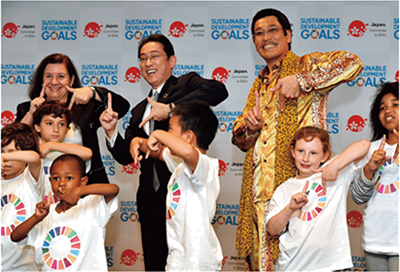 PIKO TARO performing at the HLPF reception hosted by the Government of Japan (July 17, New York, United States)
PIKO TARO performing at the HLPF reception hosted by the Government of Japan (July 17, New York, United States)Efforts are also being made to raise awareness about the SDGs through collaboration with the famous entertainer, PIKO TARO. At the High-level Political Forum (HLPF) held in New York in July 2017, which serves as the international forum for following up on the SDGs, Foreign Minister Kishida proposed the Public Private Action for Partnership (PPAP) as Japan's approach towards the realization of the SDGs. PIKO TARO, who gained fame worldwide for his performances of advocating the same keywords “PPAP,” gave a performance at the HLPF reception hosted by the Government of Japan. This performance received wide media coverage by press from Japan and overseas, and was met with a great response.
To raise even greater interest in the SDGs based on these initiatives, PIKO TARO was appointed as the Goodwill Ambassador for Promoting the SDGs at the Global Festa Japan 2017 event held in September the same year. Through such initiatives that involve a wide range of stakeholders, public awareness of the SDGs is growing steadily. Also in September, the Japan Securities Dealers Association established a Council for Promoting SDGs. Furthermore, at the beginning of November, Keidanren (Japan Business Federation) revised the Charter of Corporate Behavior that sets out the action guidelines that companies should comply with, for the first time in seven years. At the same time, it positioned the realization of Society 5.0 as a pillar for the achievement of the SDGs. As private companies accelerate their efforts to incorporate SDGs as part of their primary businesses, beyond the scope of corporate social responsibility (CSR), the government is also providing a strong boost for such moves through concrete measures to support them.
SDGs cannot be achieved through the government's efforts alone. All actors need to take ownership over the SDGs. The government, on its part, will also continue to take the lead in efforts moving forward, in order to strengthen and reinvigorate the world.
A Human Security
Human security is a concept aiming at creating a community in which people can fully develop their potential through protecting all individuals, and at the same time empowering them to solve their own problems. Japan identifies human security as one of its diplomatic pillars and has been working on dissemination and implementation of this notion through discussions at the United Nations, the use of the UN Human Security Trust Fund established by Japan's initiatives, and also Grant Assistance for Grassroots Human Security Projects. The 2030 Agenda also reflects the notion of human security as its core value such as “people-centered” and “leave no one behind” and its core reflects the concept of human security.
B Approaches in the Area of Disaster Risk Reduction
In the area of disaster risk reduction, 200 million people are affected by disasters every year (90% of the victims are citizens of developing countries) and the annual average loss incurred by natural hazards extends to 250 to 300 billion US dollars. Disaster risk reduction is essential for realizing poverty eradication and sustainable development.
Japan makes use of the knowledge of disaster risk reduction and mitigation, built up through its numerous experiences with disasters, to promote international cooperation in various areas of disaster risk reduction. It hosted the Third United Nations World Conference on Disaster Risk Reduction in Sendai in March 2015, and took the lead in the adoption of the “Sendai Framework for Disaster Risk Reduction 2015-2030,” a guideline for efforts by the international community in disaster risk reduction that covers 15 years from 2015. Japan is also actively involved in cooperation in the area of disaster risk reduction, announcing the “Sendai Cooperation Initiative for Disaster Risk Reduction” as an independent contribution from Japan, and declaring the provision of 4 billion US dollars in total to the area related to disaster risk reduction and training of 40,000 government officials and local leaders in the four years from 2015 to 2018.
Coinciding with World Tsunami Awareness Day (November 5), proposed by Japan and enacted unanimously at the 70th UN General Assembly held in December 2015, Japan took the lead in organizing various conferences and tsunami evacuation drills in 2016 to raise awareness and strengthen preparedness about tsunami in countries around the world; in November the same year, the High School Students Summit on “World Tsunami Awareness Day” in Kuroshio was held in Kuroshio town, Kochi Prefecture. The objective of this Summit is to pass on the experiences and lessons drawn in the field of disaster risk reduction to the youths who will bear the responsibility for the future. High school students from the countries which are vulnerable to the impact of tsunamis were invited to Japan for the Summit, where they learnt alongside with Japanese high school students about the history of tsunamis in Japan and the disaster risk reduction and mitigation initiatives put in place by the various countries. The second High School Students Summit on “World Tsunami Awareness Day” was held in Ginowan City, Okinawa, on November 7 and 8, 2017. Japan will continue to share the experiences and lessons drawn from past disasters with the world, and to promote the “mainstreaming of disaster risk reduction” that incorporates the perspectives of disaster risk reduction in the policies of every country.
C Approaches in the Area of Education
In the area of education, Japan announced “Learning Strategy for Peace and Growth,” a new strategy for Japan's international cooperation on education, in line with the timing for the adoption of the “2030 Agenda for Sustainable Development” in September 2015. The new strategy specifies “educational cooperation to achieve inclusive, equitable and quality learning,” “educational cooperation for industrial, science and technology human resource development and sustainable socio economic development,” and “establishment and expansion of global and regional networks for educational cooperation” as guiding principles. Based on these guiding principles, Japan is providing various forms of educational support in countries around the world. It is also an active participant in education support-related fora including the Global Partnership for Education (GPE).
D Approaches in Agricultural Areas
In coordination with the relevant countries, such as G7 or G20 member states and international organizations, Japan has delivered assistance for agriculture and rural development in developing countries. In April 2016, Japan hosted the G7 Niigata Agriculture Ministers' Meeting. At this Meeting, the “Niigata Declaration,” which seeks to strengthen global food security, was adopted and issued.
E Approaches in the Area of Water
Japan has continuously been the largest donor in the area of water since the 1990s and has implemented high quality assistance utilizing Japan's experiences, expertise, and technologies. Japan proactively participates in discussions in the international community, and tackles global issues in the area of water based on its contributions to date.
(2) Global Health
Overcoming health issues that threaten lives and hinder all kinds of social, cultural and economic activities is a common global challenge directly linked with human security. Japan has advocated human security, which underlines the “Proactive Contribution to Peace” and has acted in support of that principle. Japan regards health as its indispensable element. Japan has achieved the world's highest healthy life expectancy and is further expected to play a proactive role in the area of health. Japan aims to realize the international community that enhances the people's health as well as ensures the right to health through assisting the area of global health.
Under this principle, Japan has achieved remarkable results in overcoming health issues such as infectious diseases outbreak, maternal and child health and nutrition improvements through cooperation with a number of countries and various international organizations, including the World Health Organization (WHO), the World Bank, the Global Fund to Fight AIDS, Tuberculosis and Malaria (the Global Fund), Gavi, the Vaccine Alliance (Gavi), the United Nations Population Fund (UNFPA), and the United Nations Children's Fund (UNICEF).
Based on the Basic Design for Peace and Health, a theme-based policy for the Development Cooperation Charter formulated in 2015, and bearing in mind the achievement of Universal Health Coverage (UHC) that ensures the provision of basic health services throughout the lives of all people, Japan demonstrated its leadership ability and took the lead in discussions.
Japan has hosted an event to promote UHC at the UN General Assembly in September. At this event, Prime Minister Abe explained that the realization of UHC, which is positioned as an international goal in the Sustainable Development Goals (SDGs), contributes not only to resolving issues in the health sector, but also to the development of foundation for people's everyday lives as well as the correction of disparities, thereby playing an extremely important role in achieving many of the SDGs goals. He also reaffirmed the importance of UHC with leaders who are driving the global health sector. The UHC Forum 2017 held in Tokyo in December was attended by the UN Secretary-General Guterres, as well as a large number of people such as the heads of states, health ministers, and heads of international organizations. At this Forum, Prime Minister Abe emphasized that, in order to accelerate the promotion of UHC, it is crucial to enhance the momentum towards UHC, promote the coordination among the national governments and donors, advance the continuous monitoring and evaluation, mobilize resources inside and outside of the country, and promote innovation. He further announced that Japan will provide assistance amounting to approximately 2.9 billion US dollars in the coming years to push forward the efforts towards UHC by countries and organizations. Furthermore, in order to promote initiatives in the area of nutrition, which forms the basis for good health, he announced that Japan would be hosting the Nutrition for Growth Summit in 2020 (See Special Feature “UHC Forum 2017”).
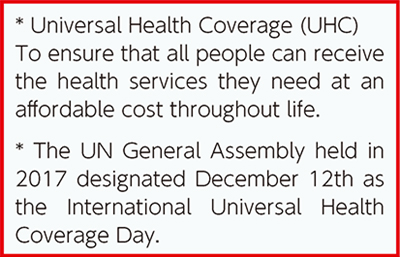
The vision of “Health for all” looks hard to realize. The latest data shows that at least half of the world's population does not have full coverage of essential health services. The international community should work more actively to improve this situation.
Japan has been playing a leading role in the area of global health drawing on its experience and knowledge including the national health insurance system. Prime Minister Abe has continued to promote Universal Health Coverage (UHC) as a “Japan brand.” Therefore, he actively refers to this policy at such occasions as the G7, TICAD and the United Nations General Assembly meeting.
As one of these efforts, “UHC Forum 2017” was held in Tokyo on December 13 and 14, 2017, with the aim of further promoting UHC. Co-organized by the Ministry of Foreign Affairs, the Ministry of Finance, the Ministry of Health, Labour and Welfare, the World Bank, the World Health Organization (WHO), the United Nations Children's Fund (UNICEF), UHC2030, and the Japan International Cooperation Agency (JICA), this Forum welcomed about 600 participants from 61 countries.
This Forum, attended by Prime Minister Abe, brought together high level officials including Presidents and Health Ministers of various countries, representatives of international organizations including UN Secretary-General Guterres, World Bank Group President Kim, WHO Director-General Tedros, and UNICEF Executive Director Lake, and international health experts. They actively discussed how to promote UHC internationally. “UHC Tokyo Declaration” was adopted as the commitment to accelerate the efforts towards achieving UHC by 2030 by the co-organizers of the forum.
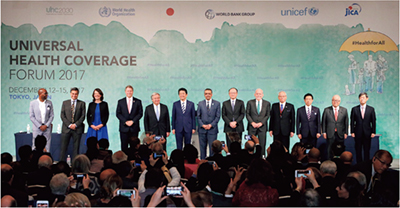 High-level Opening Session
High-level Opening Session(December 14, Tokyo, Photo: Cabinet Public Relations Office)
Prime Minister Abe proposed building and strengthening of a platform for the promotion of UHC to realize a society where “no one will be left behind,” the core principle of the SDGs. He also emphasized the importance of cross-sectoral efforts, covering such fields as water and sanitation, nutrition, etc., and announced that Japan will provide assistance amounting to approximately 2.9 billion dollars in coming years to push forward the efforts towards UHC by countries and organizations.
The global situation and progress of UHC and the measures against public health emergencies, as well as various international initiatives related to UHC, were introduced at the Expert's Meeting. Thematic breakout sessions were also held on strengthening of health system and health workers, financing for UHC, access to medicine, and health needs in the aging society, all of which are the important challenges to achieving UHC.
The UN High-level Meeting on UHC will be held in 2019. Japan will continue to cooperate with various governments and organizations to promote UHC.
(3) Labor
It is important to raise income levels through employment, in order to raise the living standards of those living in poverty. Against the background of an expanding supply-chain worldwide, it is necessary to put effort into developing the labor environment, and to realize “decent work” (work that is of an acceptable quality for motivated human beings) around the world. The realization of “decent work” has been positioned as a primary objective of the activities of the International Labor Organization (ILO), which marks its 100th anniversary in 2019.
In view of this, Japan is also engaged in development cooperation in the field of labor. In 2017, Japan offered technical cooperation to developing countries in the Asia Pacific region, including the development of labor laws related to social security, capacity building, and occupational health and safety, as well as the improvement of enforcement systems, by making voluntary contributions to the ILO and providing support to networks of international labor organizations.
In May, the ILO Director-General Ryder visited Japan for the first time in four years. He paid a courtesy call to Prime Minister Abe and Foreign Minister Kishida, and signed a memorandum of cooperation with Minister of Health, Labor and Welfare Yasuhisa Shiozaki to affirm the strengthening of cooperation between Japan and the ILO.
(4) Environmental Issues and Climate Change
A Global Environmental Issues
There is growing awareness internationally of the importance of efforts to address the global environmental issues. For example, the 2030 Agenda for Sustainable Development sets out goals for the environmental sector. Japan is fully engaged in conserving the natural environment and realizing sustainable development, through its active participation in negotiations and encouragement of other parties in international organizations concerning multilateral environmental treaties and environmental matters. At the third session of the UN Environment Assembly (UNEA-3) held in Nairobi, Kenya in December, discussions were held to further advance international cooperation in the field of the environment.
(A) Conservation of Biodiversity
Japan ratified the Nagoya Protocol on Access to Genetic Resources and the Fair and Equitable Sharing of Benefits Arising from their Utilization to the Convention on Biological Diversity, and the Nagoya–Kuala Lumpur Supplementary Protocol on Liability and Redress to the Cartagena Protocol on Biosafety, under the Convention on Biological Diversity (CBD), in May and December respectively. Japan will further promote international cooperation towards the conservation of biodiversity and sustainable use, including the faithful implementation of these protocols.
In recent years, illegal trade of wildlife, such as elephants and rhinoceros, is becoming an increasingly severe issue. It is also drawing the attention of the international community as one of the sources of funding for international terrorist organizations. In light of this situation, the UN Resolution on Tackling Illicit Trafficking in Wildlife was adopted for the third consecutive year at the UN General Assembly held in September. Japan participated as a co-sponsor of the resolution, just as it did in the previous times.
In November, at the 53rd Council of the International Tropical Timber Organization (ITTO) held in Lima, Peru, discussions were held on the promotion of sustainable forest management.
(B) International Management of Hazardous Chemicals/Hazardous Waste
In August, the Minamata Convention on Mercury entered into force. This Convention sets out comprehensive regulations for mitigating the risks that mercury poses to human health and the environment. In September, the first meeting of the Conference of the Parties was held in Geneva, Switzerland, and was attended by 68 countries that are party to the Convention including Japan. Japan took a proactive stance in communicating its technology and knowhow on preventing damage from mercury to the world, and declared that it will continue to exert its leadership with the aim of promoting global mercury countermeasures.
In November, the 11th Conference of Parties to the Vienna Convention for the Protection of the Ozone Layer, as well as the 29th Meeting of the Parties to the Montreal Protocol on Substances that Deplete the Ozone Layer, were jointly held in Montreal, Canada. At these conferences, discussions were held on the enforcement of production and consumption regulations for substances that are destructive to the ozone layer, based on the adoption of the amendment made previous year to add hydrofluorocarbons (HFC) to the list of controlled substances under the Protocol.
(C) Conservation of the Marine Environment
In June, the UN Conference to Support the Implementation of Sustainable Development Goal 14 was held at the UN Headquarters in New York. During the conference, discussions were held on promoting efforts that are focused on the conservation and sustainable use of the seas and marine resources. Japan provided information about measures to counter marine waste and acidification of the seas, as well as its cooperation towards the international conferences of Pacific Alliance Leaders Meeting (PALM) and Small Island Developing States (SIDS). It also declared its intention to continue contributing to the realization of SDG 14.
At the G20 Hamburg Summit (Germany) held in July, a declaration was made on the establishment of two initiatives: the G20 Resource Efficiency Dialogue, and the G20 Action Plan on Marine Litter.
At the 12th meeting of the Conference of the Parties to the London Convention (Convention on the Prevention of Marine Pollution by Dumping of Wastes and Other Matter) held in September, the implementation of the strategic plans and the draft operational plan were adopted.
With regard to the conservation of the marine environment of the Sea of Japan and the Yellow Sea, the 22nd Intergovernmental Meeting for the Northwest Pacific Action Plan (NOWPAP), which involves cooperation among Japan, China, South Korea, and Russia, was held in Toyama in December. At this meeting, an agreement was reached on the Mid-Term Strategy for NOWPAP covering 2018 to 2023, as well as the Regional Action Plan on Marine Litter.
B Climate Change
(A) Entry into Force of the Paris Agreement, and the 23rd Session of the Conference of the Parties to the United Nations Framework Convention on Climate Change (COP23)
A concerted effort by the international community is essential in reducing greenhouse gas emissions that cause climate change; however, the Kyoto Protocol adopted at the third session of the Conference of the Parties to the UN Framework Convention on Climate Change (COP3) in 1997 required only developed countries to reduce greenhouse gas emissions. As a result of active negotiations spanning several years, including the “Durban Agreement” of 20114, the Paris Agreement was adopted at COP21 held in Paris in December 2015. The Paris agreement is a fair and effective framework that provides for the submission of greenhouse gas emission reduction targets (nationally determined contribution) by each country, with no distinction between developing and developed countries, and for the implementation of measures toward the achievement of these targets. This Agreement entered into force in November 2016, and has been ratified by more than 170 countries including Japan (as of December 2017). The U.S. announced its intention to withdraw from the Paris Agreement in June 2017, but it has continued to participate in climate change negotiations at COP and other fora.
In November 2017, COP23 was held in Bonn, Germany under the chairmanship of Fiji. At COP23, the focus of discussions was placed on developing discussions on the implementation guidelines of the Paris Agreement to be adopted by 2018 in accordance with the decision at COP22 in 2016. Japan participated in COP23 with three main objectives: (1) furthering discussions on the implementation guidelines of the Paris Agreement, (2) completion of the design of Talanoa Dialogue, which is a facilitative dialogue to stocktake collective efforts to reduce emissions which will be started in 2018 and (3) accelerating Global Climate Action. The three objectives were largely achieved in various aspects of the outcomes of the conference. Some developing countries pushed for reopening the Paris Agreement. They maintained their pre-Paris positions that only developed countries were required to take actions, and also argued for treating all agendas equally on the time allocation and the format of outcome of the session. Developed countries were opposed to these arguments, and Japan emphasized that the guidelines should promote all countries' efforts on climate change and should not be bifurcated. Since there are clear differences between views of developed and developing countries, the challenge will remain in finding a way to develop the guidelines constructively while maintaining the mandate of the Paris Agreement. Japan contributed to the success of CPO23 by supporting Fiji, the COP23 Presidency, on both negotiation and promotion of global climate actions, including offering various forms of support such as organizing the Reginal Workshop to prepare for COP23 in the Asia-Pacific. Japan actively participates in the development of the Agreement through close collaboration with related countries.
- 4 Contents included (1) Agreement on a new legal framework for all countries to participate by the year 2015; (2) The entry into force of the same framework from 2020. Decided on at COP17.
(B) Approach on Support for Developing Countries
As many developing countries are unable to adequately implement climate change policies with solely their own funds and implementation capabilities, developed countries including Japan are engaged in initiatives to provide active support for developing countries. From this perspective, the Green Climate Fund (GCF) also plays an important role as a multilateral fund that provides support to developing countries for adapting to the impact of greenhouse gas emission reductions and climate change. Japan contributes funds to the GCF based on the Act on Contribution to the Green Climate Fund (GCF) and the Accompanying Measures enacted in 2015, and participates actively in the management of the Fund as a board member of GCF, including the selection of projects to provide support to. As of December 2017, the GCF Board has approved 54 projects to support.
(C) Joint Crediting Mechanism (JCM)
The JCM is a mechanism for evaluating contributions from Japan to GHG emission reductions or removals in a quantitative manner, and using them to achieve Japan's emission reduction target through the diffusion of leading low carbon technologies, as well as implementation of mitigation actions in developing countries. The mechanism also contributes to addressing climate change on a global scale. As of December 2017, Japan has established the JCM with 17 partner countries, and implemented more than 120 projects related to the reduction or removal of greenhouse gases. In 2017, the initiative has steadily produced results, with the issuance of credits from JCM projects in Mongolia and Viet Nam.
(D) Japan's Initiatives on Climate Change and Fragility Risk
The view that climate change can have an impact on the stability of economies and societies in every country has been growing increasingly prevalent in recent years, alongside with growing interest in its impact on security such as conflicts and peacebuilding. Against this backdrop, a roundtable seminar was held in January 2017, attended by guests such as representatives from the G7 countries and experts from Japan and abroad. This seminar was held as a part of initiatives on the fragility risk of climate change, on which discussions have been ongoing at the G7 Ministerial Meetings and Working Groups. Thereafter, a report titled “Analysis and Proposal of Foreign Policies Regarding the Impact of Climate Change on Fragility in the Asia-Pacific Region –With focus on natural disasters in the Region –” was drawn up on this theme, based on hints and ideas gained from the various experts from Japan and abroad. This report was published in September. The contents of this report as well as discoveries were presented as Japan's contributions at the G7 Climate Change and Fragility Working Group held in Italy in October, and also introduced to the Pacific countries participating in the COP preparatory workshop in Fiji in September. Furthermore, it was also presented at a side event at the Japanese pavilion at COP23, and was received favorably by the attendees on all the occasions.
(5) Arctic and Antarctic
A Arctic
(A) The Rapidly Changing Arctic Environment, and Japan's Response
There is a risk that rapid changes in the Arctic environment caused by global warming (melting of sea ice, permafrost, ice sheet and glaciers, etc.) will have a drastic and irreversible impact on the ecology and the lives of those living in the Arctic, including indigenous peoples. At the same time, as the decreasing amount of sea ice has expanded the navigable area, there has been growing interest in new possibilities and economic activities such as the use of the Northern Sea Route and the development of mineral and biological resources.
Discussions are ongoing about appropriate economic activities that could enable sustainable development while conserving such an Arctic environment. Furthermore, international fora including the Arctic Council (AC) and International Maritime Organization (IMO) have been working on international rule-making in order to ensure the actions are based on the rule of law on issues of territorial rights and maritime delimitation in the Arctic.
On the basis of increased interest by the international community over the Arctic, and in order to define the policy for more specific measures, the government adopted “Japan's Arctic Policy” in October 2015 as its first comprehensive Arctic policy, which clarified Japan's approach to the Arctic.
(B) Japan's International Activities on the Arctic
Based on this policy, Japan contributes to the international community in addressing Arctic issues by making use of its particular strength in science and technology.
a. Research and Development
To promote Arctic research that contributes to global policy decision making and problem solving, the Arctic Challenge for Sustainability (ArCS) project was launched in FY2015. Efforts such as international collaborative research in the Arctic and cooperative systems with stakeholders are continuously strengthened. Japan also promotes international cooperation in research and human resource development at research and observation stations in the Arctic regions of the U.S., Canada, Russia, Norway, and Greenland (Denmark).
b. International Cooperation
Ambassador in charge of Arctic Affairs Keiji Ide attended the Senior Arctic Official (SAO) meetings of the AC, in which Japan was formally admitted as an observer in 2013. He also participated in the international conferences on the Arctic organized by Russia, Iceland, Finland, and Denmark, and actively presented Japan's engagements and thoughts over the Arctic. Furthermore, he held consultations on the Arctic with the relevant countries, including the Arctic States. Japanese researchers presented outcomes of their research on the Arctic at the AC working groups which deal with specific themes. They also collaborate with researchers from other countries towards the resolution of the Arctic issues.
Japan hosted the Second Trilateral High-Level Dialogue on the Arctic among Japan, China and the ROK in Tokyo in June. The Dialogue was launched at the 6th Japan-China-ROK Trilateral Summit held in 2015. It was attended by the Ambassadors in charge of Arctic Affairs and the Special Representative for the Arctic from the three countries, and adopted the joint declaration which includes the importance of maintaining cooperation based on a rule-based maritime order, and cooperative projects on scientific research by the three countries.
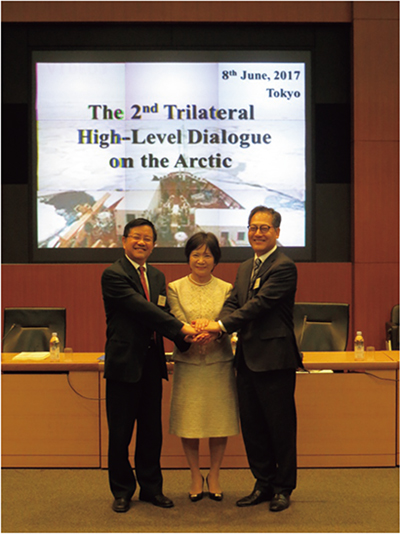 The Second Trilateral High-Level Dialogue on the Arctic (June 8, Tokyo)
The Second Trilateral High-Level Dialogue on the Arctic (June 8, Tokyo)c. Sustainable Use
Amidst growing interest by the international community in the future potential of the Northern Sea Route, Japan participates in international discussions, including the AC, and emphasizes the importance of international cooperation over the issues such as the stable use of the sea route and the development of an environment for that purpose, impacts of shipping on the maritime environment and securing the safety of navigation.
B Antarctic
(A) The Antarctic Treaty
The Antarctic Treaty adopted in 1959 sets forth the following three basic principles: (1) the use of the Antarctica for peaceful purposes, (2) freedom of scientific investigations and international cooperation, and (3) a freeze on territorial rights and claims.
(B) The Antarctic Treaty Consultative Meeting (ATCM) and the Protection of Antarctic Environment
At the 40th Antarctic Treaty Consultative Meeting (ATCM 40) held in Beijing, China, from May 22 to June 1, active discussions were held about tourism and activities by non-governmental organizations in the Antarctic. At the same time, guidelines on dealing with emergency situations and other matters were revised, while procedures and guidelines were drawn up for new applications for the qualification to be parties to the ATCM. In addition, Mr. Lluberas (from Uruguay) was elected as the incoming Executive Secretary (to assume office in September), succeeding Dr. Reinke (from Germany), whose term ends this year.
(C) Japan's Antarctic Observation
Based on the 9th six-year plan of the Japanese Antarctic Research Expedition (2016 to 2021), Japan is undertaking efforts to elucidate the global system and changes in the global environment, as well as to predict its future. To that end, in addition to long-term continuous observation, it is also implementing various research and observation activities, including observation using large aperture atmospheric radar.


